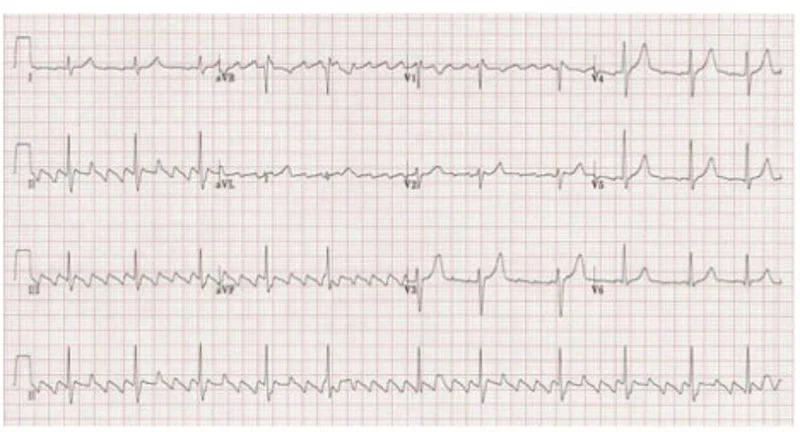MEDBULLETIN SEPTEMBER 2017

Scenario
The above ECG is that from a 43 year old man who presented with palpitations and feeling his heart rate remain high for longer than usual after exercising. He is normally very fit and active – he is a keen long distance cyclist and participates in triathlons. He has no traditional cardiovascular risk factors or significant medical history and is not on any regular medication.
Questions
- What does the ECG show?
- How would you manage this patient?
Answers
- Typical atrial flutter (counterclockwise flutter in the right atrium). The ECG shows the typical saw-toothed flutter waves in the inferior leads (II, III and aVF). Note the RR interval is slightly irregular, but this is not atrial fibrillation.
- The patient should have an echocardiogram to assess his cardiac structure and function and a 24-hour Holter monitor to determine whether the atrial flutter is paroxysmal or persistent. An exercise treadmill test or stress echo would also be useful to assess for myocardial ischaemia (his risk of having coronary artery disease is low but not negligible).
There is a known association between endurance sports and the later development of atrial arrhythmias. He does not need oral anticoagulation as his risk of thromboembolism is very low (CHADS2VASc score zero), but his atrial flutter should be treated as completely as possible as he is significantly impaired by the arrhythmia.
The best option would be catheter ablation of the flutter, which is a relatively low risk procedure with a high success rate (>95% cure rate) and can avoid the need for long term medication. As he would like to continue cycling, he is unlikely to be willing to take long term antiarrhythmic medication which could impair his performance. Synchronized DC cardioversion may be considered if the Holter shows persistent atrial flutter, but this would only be a temporary measure and his atrial flutter is likely to recur; thus this would not be the best option.
ANSWERS TO ECG QUIZ
MedBulletin May 2025
MedBulletin Nov 2024
MedBulletin April 2024
MedBulletin Dec 2023
MedBulletin May 2023
MedBulletin Nov 2022
MedBulletin May 2022
MedBulletin Nov 2021
MedBulletin Mar 2021
MedBulletin Sep 2020
MedBulletin April 2020
MedBulletin Sep 2019
MedBulletin March 2019
MedBulletin Sep 2018
MedBulletin March 2018
MedBulletin Sep 2017
MedBulletin March 2017
MedBulletin Sep 2016
2016 Quiz
2015 Quiz
MedBulletin May 2025
MedBulletin Nov 2024
MedBulletin April 2024
MedBulletin Dec 2023
MedBulletin May 2023
MedBulletin Nov 2022
MedBulletin May 2022
MedBulletin Nov 2021
MedBulletin Mar 2021
MedBulletin Sep 2020
MedBulletin April 2020
MedBulletin Sep 2019
MedBulletin March 2019
MedBulletin Sep 2018
MedBulletin March 2018
MedBulletin Sep 2017
MedBulletin March 2017
MedBulletin Sep 2016
2016 Quiz
2015 Quiz